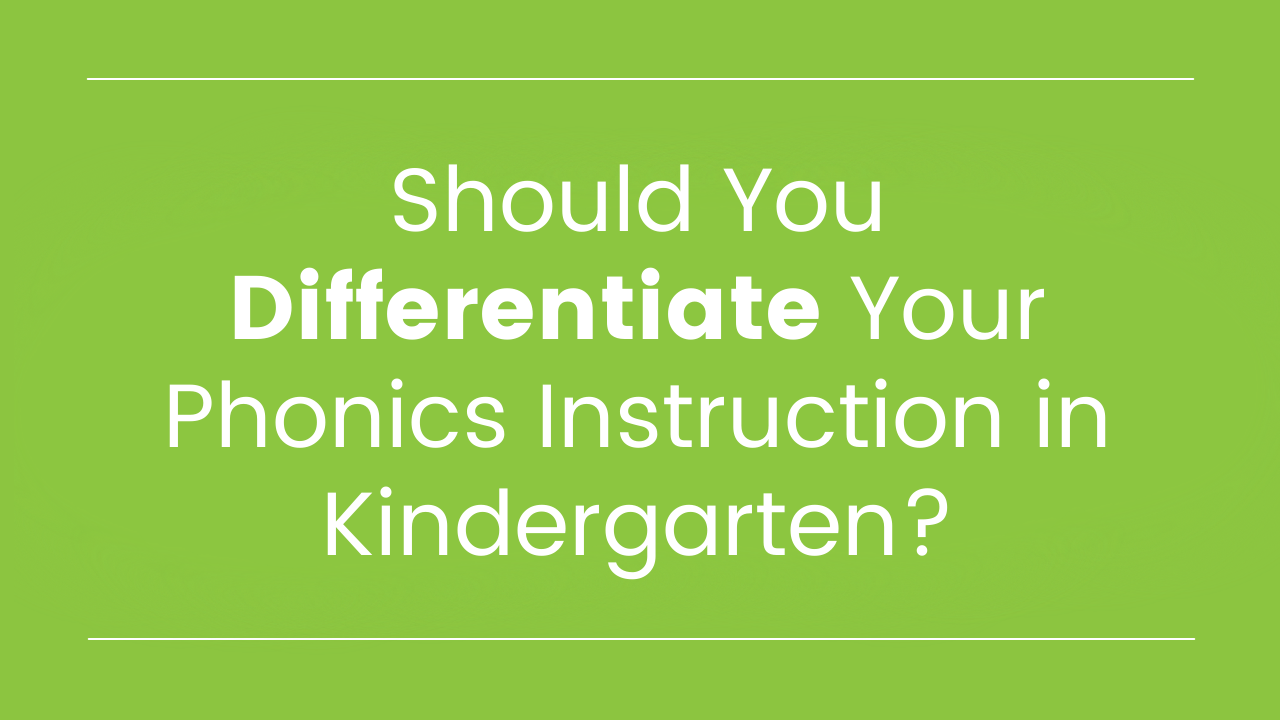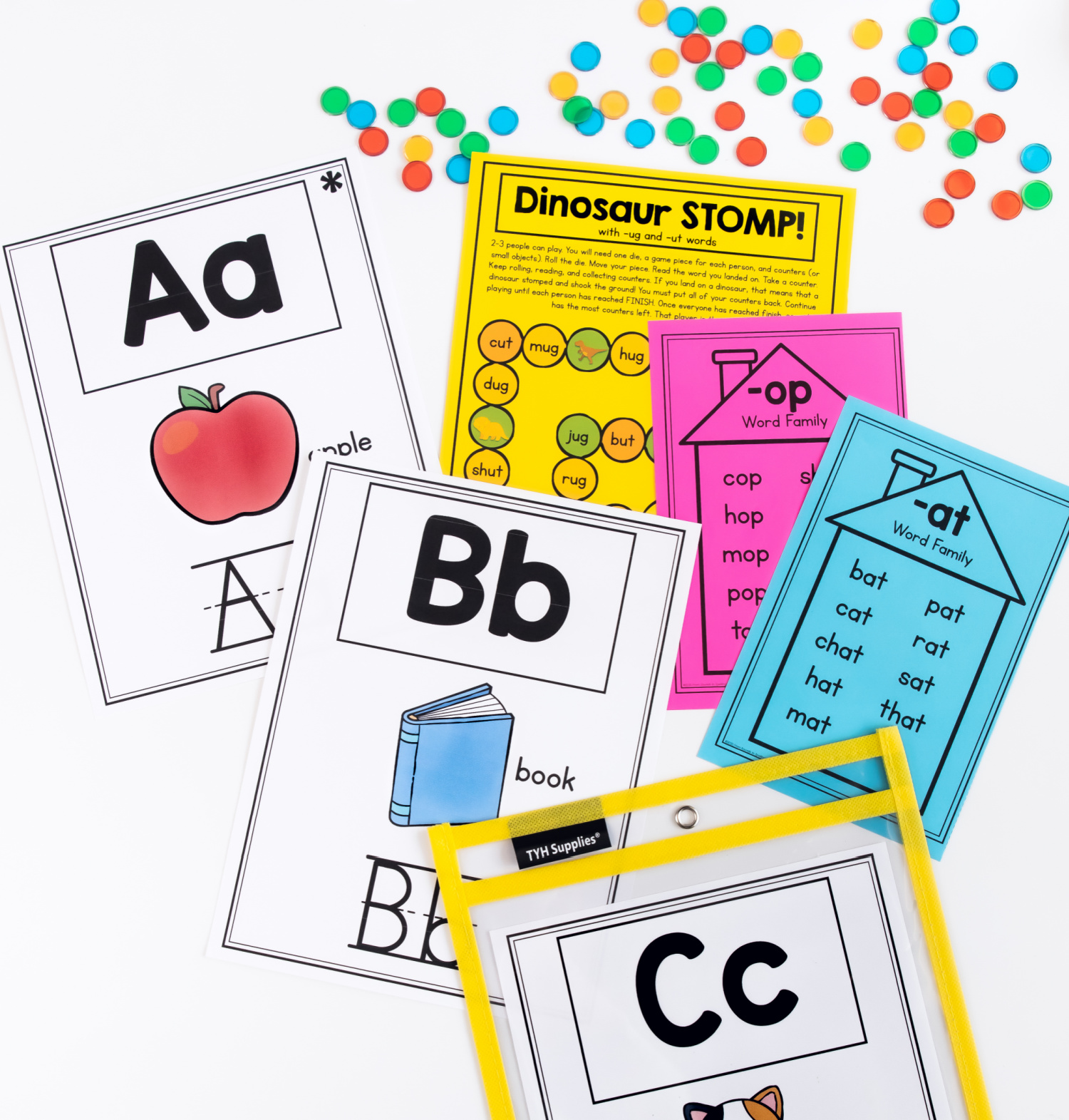
Should You Differentiate Your Phonics Instruction in Kindergarten?
At the beginning of the school year, Kindergarten teachers across the U.S. begin teaching the alphabet to their new students. In most cases, students are taught both the letter names and the letter sounds. However, some students begin Kindergarten already knowing much of or all of the alphabet. You might wonder, "Should these students have to sit through months of the ABCs when they already know them?"
Differentiating your phonics instruction (including learning the letter names and sounds) means teaching different skills to students, depending upon what they need to work on. Theoretically, to differentiate your phonics instruction in Kindergarten would mean to work on different alphabet letters with different students. Then, after you've taught the alphabet, it would mean that different groups of students would continue to work on different skills - from alphabet review, to reading CVC words, and perhaps even learning consonant blends and long vowels.
First, let's address the topic of differentiating your alphabet instruction. This would likely take place in a small group setting, as you work with different groups of students on different letters. This could definitely lead to positive outcomes for students, because kids would be working on the skills that they, specifically, need to master. However, it often isn't practical at the beginning of Kindergarten. Here's why:
- Small group instruction requires students to be able to work independently, without needing direct support from the teacher. When you pull a small group of students, the other students will be "on their own," so to speak, unless you have an aide or a co-teacher directing activities. At the beginning of Kindergarten, at least in the U.S., many students are not able to work (or play) independently for extended periods of time. They are still learning basic rules and expectations, like how to use an appropriate voice level or how to get along with their peers. While these basic skills are addressed all year long, most Kindergarten teachers prefer to spend more time on them during the beginning of the school year. If you set clear expectations and are present to provide praise/redirect students when they are not followed, this sets the tone for the rest of the school year. Small group instruction may not be practical for the first weeks or months of Kindergarten, since your focus will be on teaching procedures and routines, and the entire group will require close supervision.
- Even though students may know letter names and sounds, they may not have mastered related skills, like knowing how to correctly form letters, or being able to identify pictures that begin with the letter's sound. Therefore, even if a student "knows" a letter, there is likely still value in having them complete activities related to the letter - i.e. handwriting practice or a picture sort.
- At the beginning of the school year, time and attention should be devoted to building a classroom community. This requires experiences like whole-class storytime, whole-class lessons, and so on. Students learn more effectively when they feel safe. Using small group instruction is valuable, but at the beginning of the year, you may choose to have more whole-group instruction for the purpose of building that classroom community.
All of that said, just because you aren't pulling small groups and fully differentiating your phonics instruction does not mean that you can't accommodate individual student needs. If you have some students who are already reading, by all means, keep a basket of decodable texts available for them to read when they finish an alphabet activity. Or if some students are struggling, you can quickly pull them together to work on a skill, even if it's not a formal small group complete with center activities for the other students. Minimal differentiation is both valuable and practical!
Next, let's discuss differentiation after you finish teaching the alphabet. Depending upon how long it takes you to get through all the letters, several months of Kindergarten may have already passed. At this point, you can assess your students to determine which letters they mastered and which letters they still need to work on. You may also want to give some sort of word or reading assessment to your more advanced students.
From here, you can place students into small groups. Now that students have been in Kindergarten for months, they will have gained a bit more independence. They will likely be able to work and/or play on their own for longer periods of time than they could at the beginning of the school year. Therefore, differentiation through small group instruction is more feasible! You can work with each group on the skills that they need to master - whether those skills are alphabet letters, reading CVC words, or beyond.
In a nutshell, the answer to the question "Should You Differentiate Your Phonics Instruction in Kindergarten?" is YES - but under certain circumstances. We never want to sacrifice teaching basic procedures, routines, and social skills in order to rush into differentiation via small group instruction.
To see exactly how you might differentiate your phonics instruction in Kindergarten, grab a free week of our phonics program, From Sounds to Spelling (R) at this link!





